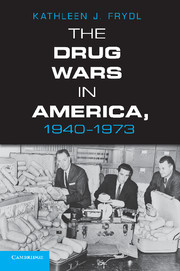2 - Presumptions and Pretense
The U.S. Response to the International Trade in Narcotics, 1945–1960
Published online by Cambridge University Press: 05 April 2013
Summary
The ethnic stereotypes and dim prospects for post–World War II democratic reconstruction of Germany voiced by Bureau of Narcotics officials, while notable, were trivial compared to the Bureau’s assessment of East Asia. Throughout the postwar years, Narcotics commissioner Harry Anslinger and his men projected their “good guys, bad guys” view of narcotics trade through the Asian prism, illuminating the essential character of nations for Americans to better apprehend, or so they believed. Anslinger seized on opportunities to nominate illicit narcotics trade as one more repugnant dimension to America’s already hated enemies – first the Japanese empire, then Communist China. His purported knowledge of adversaries engaged in disreputable acts made his enforcement portfolio relevant to some of the most urgent issues of the day. By successfully insinuating himself into Asian politics, Anslinger presided over an awkward and occasionally hostile marriage between his Republican, religious missionary worldviews and an emerging democratic internationalism premised on trade and multilateral agreements and institutions. However imperfect, the resulting hybrid of expanding global presence combined with a crusading impulse shaped much of the United States’ experience of the world in the postwar era.
In this way, Anslinger was both an architect and an emblem of American global engagement throughout the 1950s. Not surprisingly, his global vision resembled his domestic views, including his tendency to view illicit narcotics traffic not as an activity to detect and interdict, but as a proclivity, even a moral failing, to impute to unsavory types and denounce in strident terms. As before, this led to miscalculations, none more serious than Anslinger’s incorrect though impassioned belief in the volume of and interest in narcotic smuggling by Communist China. When Bureau agents discovered ethnic (Han) Chinese suspected of illicit trafficking in Europe, they used this identity to sketch an unbroken chain back to the mainland; unfortunately for the agents who made these racial calculations, these entrepreneurs were part of a global Nationalist or Kuomintang (KMT) diaspora fleeing Communist China. In this and many other ways, it is impossible to understand Anslinger’s historic blunders without acknowledging the racialized and highly reductivist views he and most Americans held regarding East Asia.
- Type
- Chapter
- Information
- The Drug Wars in America, 1940–1973 , pp. 59 - 119Publisher: Cambridge University PressPrint publication year: 2013



